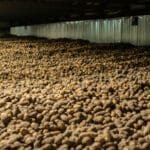U.S. and Canadian trade negotiators might need to add spuds to a list that already includes cheese, steel and softwood lumber.
A Republican senator has asked his government to investigate allegations by American farmers that Canadians are illegally dumping potatoes into their market, potentially opening a new front in the two nations’ trade war.
A Democratic member of the senate has added her voice, too, suggesting there’s a “strong case” that Canadians are unfairly taking away American share of the tuber market.
U.S. producers point to the surge in imports from across the border in recent years, and say they suspect the lower price of Canadian potatoes is due to government subsidies or dumping.
And they charge that Canadian rules have all but closed the market here to them.
“At some point, you reach a boiling point where you say ‘Enough is enough, we’re going to start to figure out what’s going on here and take action’,” Donavon Johnson, president of the Northern Plains Potato Growers Association, said Thursday.
Canadian farmers respond that they are just benefiting, in part, from a favourable exchange rate, and say there is nothing to the subsidy allegation.
Regardless, Johnson and colleagues visited Washington, D.C. recently, meeting with officials from the U.S. Trade Representative’s office — the body holding NAFTA talks with Canada, the Commerce Department and U.S. International Trade Commission (ITC).
Sen. John Hoeven, from North Dakota, said he is now urging the ITC and the Senate’s finance committee to study the impact of Canadian trade on the nation’s potato producers.
“Unfair treatment from our trading partners is exactly what we are trying to resolve through these trade negotiations,” Hoeven said in a recent statement.
Sen. Heidi Heitkamp, also from North Dakota and locked in a neck-and-neck electoral battle with her Republican challenger, said she raised the issue at a meeting with Canada’s deputy ambassador to the U.S.
“Red River Valley potato growers have a strong case to be made that Canada has unfairly limited their profits and narrowed their fair market access,” said Heitkamp in a release last month.
Johnson said his group — representing growers in North Dakota and Minnesota – was spurred into action by the growing flow of Canadian fresh potatoes into the U.S. Those are separate from seed potatoes or those used for making french fries, chips or other processed products.
Canadian exports of potatoes — almost all to the U.S. — grew 41 per cent over the five years leading up to 2016, according to a Canadian Agriculture and Agri-Food Department report, with $212 million in fresh potatoes shipped to the U.S. in 2015-16.
At the same time, American potato farmers have seen demand for their product drop, resulting in a steady shrinkage in potato acreage. The area farmed dropped by eight per cent just last year, Johnson said.
Buyers tell the American producers that Canadian potatoes are simply cheaper, he said.
And fueling their concerns is evidence of government subsidy of the Canadian industry.
A cursory online review does find a number of news releases about government programs to help the potato industry. They include an investment of up to $4.5 million announced by Ottawa this April for robotic equipment to pack and sort fresh potatoes at a plant in Quebec, “helping the company develop new markets in the United States.”
But David Jones, head of the potato industry for the Canadian Potato Council, said most government support programs are loans that must be matched 50-50 with an investment by the recipient, and repaid over 10 years.
If there is a price advantage currently for Canadian farmers in the States, it has much to do with the low value of their dollar, he said.
“There is no subsidy for Canadian potatoes being exported to the U.S.,” said Jones. “We have favourable conditions right now with the exchange rate, shipping into the U.S.”
Johnson also complained about the system of “ministerial exemptions” in Canada, which bars exports if the potatoes can be sourced locally, creating a “closed, protectionist market” for Americans.
With about 90 per cent of its potato exports destined for the U.S., Canada had a $113-million potato trade surplus with the States in 2016.
Jones, however, said Canadian farmers are subject to the same rules, meaning that a P.E.I. grower cannot ship into Ontario unless there is a shortage in that province. And both Americans and Canadians are free to ship potatoes without restriction in “standard” 110-lb. containers — as opposed to by the truckload, he said.
“There just needs to be some clarity around what the rules are,” said Jones.










